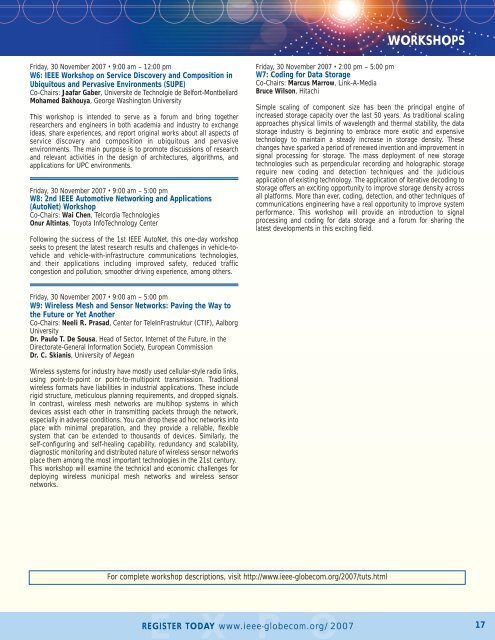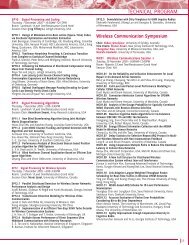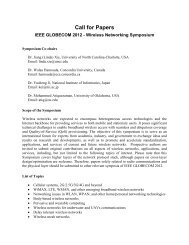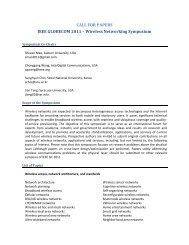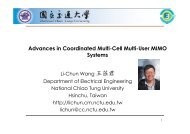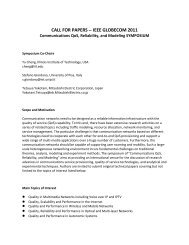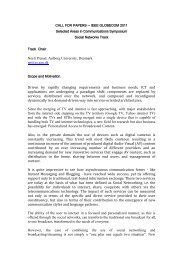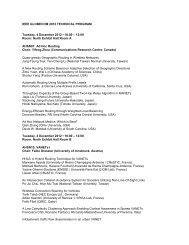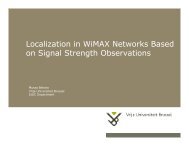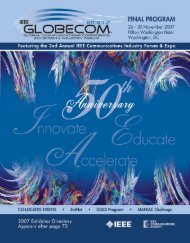information - IEEE GLOBECOM 2013
information - IEEE GLOBECOM 2013
information - IEEE GLOBECOM 2013
You also want an ePaper? Increase the reach of your titles
YUMPU automatically turns print PDFs into web optimized ePapers that Google loves.
WORKSHOPS<br />
Friday, 30 November 2007 • 9:00 am – 12:00 pm<br />
W6: <strong>IEEE</strong> Workshop on Service Discovery and Composition in<br />
Ubiquitous and Pervasive Environments (SUPE)<br />
Co-Chairs: Jaafar Gaber, Universite de Technolgie de Belfort-Montbeliard<br />
Mohamed Bakhouya, George Washington University<br />
This workshop is intended to serve as a forum and bring together<br />
researchers and engineers in both academia and industry to exchange<br />
ideas, share experiences, and report original works about all aspects of<br />
service discovery and composition in ubiquitous and pervasive<br />
environments. The main purpose is to promote discussions of research<br />
and relevant activities in the design of architectures, algorithms, and<br />
applications for UPC environments.<br />
Friday, 30 November 2007 • 9:00 am – 5:00 pm<br />
W8: 2nd <strong>IEEE</strong> Automotive Networking and Applications<br />
(AutoNet) Workshop<br />
Co-Chairs: Wai Chen, Telcordia Technologies<br />
Onur Altintas, Toyota InfoTechnology Center<br />
Following the success of the 1st <strong>IEEE</strong> AutoNet, this one-day workshop<br />
seeks to present the latest research results and challenges in vehicle-tovehicle<br />
and vehicle-with-infrastructure communications technologies,<br />
and their applications including improved safety, reduced traffic<br />
congestion and pollution, smoother driving experience, among others.<br />
Friday, 30 November 2007 • 2:00 pm – 5:00 pm<br />
W7: Coding for Data Storage<br />
Co-Chairs: Marcus Marrow, Link-A-Media<br />
Bruce Wilson, Hitachi<br />
Simple scaling of component size has been the principal engine of<br />
increased storage capacity over the last 50 years. As traditional scaling<br />
approaches physical limits of wavelength and thermal stability, the data<br />
storage industry is beginning to embrace more exotic and expensive<br />
technology to maintain a steady increase in storage density. These<br />
changes have sparked a period of renewed invention and improvement in<br />
signal processing for storage. The mass deployment of new storage<br />
technologies such as perpendicular recording and holographic storage<br />
require new coding and detection techniques and the judicious<br />
application of existing technology. The application of iterative decoding to<br />
storage offers an exciting opportunity to improve storage density across<br />
all platforms. More than ever, coding, detection, and other techniques of<br />
communications engineering have a real opportunity to improve system<br />
performance. This workshop will provide an introduction to signal<br />
processing and coding for data storage and a forum for sharing the<br />
latest developments in this exciting field.<br />
Friday, 30 November 2007 • 9:00 am – 5:00 pm<br />
W9: Wireless Mesh and Sensor Networks: Paving the Way to<br />
the Future or Yet Another<br />
Co-Chairs: Neeli R. Prasad, Center for TeleInFrastruktur (CTIF), Aalborg<br />
University<br />
Dr. Paulo T. De Sousa, Head of Sector, Internet of the Future, in the<br />
Directorate-General Information Society, European Commission<br />
Dr. C. Skianis, University of Aegean<br />
Wireless systems for industry have mostly used cellular-style radio links,<br />
using point-to-point or point-to-multipoint transmission. Traditional<br />
wireless formats have liabilities in industrial applications. These include<br />
rigid structure, meticulous planning requirements, and dropped signals.<br />
In contrast, wireless mesh networks are multihop systems in which<br />
devices assist each other in transmitting packets through the network,<br />
especially in adverse conditions. You can drop these ad hoc networks into<br />
place with minimal preparation, and they provide a reliable, flexible<br />
system that can be extended to thousands of devices. Similarly, the<br />
self-configuring and self-healing capability, redundancy and scalability,<br />
diagnostic monitoring and distributed nature of wireless sensor networks<br />
place them among the most important technologies in the 21st century.<br />
This workshop will examine the technical and economic challenges for<br />
deploying wireless municipal mesh networks and wireless sensor<br />
networks.<br />
For complete workshop descriptions, visit http://www.ieee-globecom.org/2007/tuts.html<br />
E X P O<br />
REGISTER TODAY www.ieee-globecom.org/2007 17


